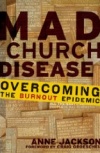Youth workers are intimately acquainted with stress. After all, our jobs are about people; and people cause stress, especially when their problems and crises become ours. Though all of us live with constant stress, few of us know how to deal with it effectively. As a result, we suffer from a multitude of stress-induced physical ailments, emotional consequences and burnout.
To help us better understand stress and how to deal it, we consulted three experts: Larry Magnuson, Anne Jackson and Dr. Henry Cloud.
An ordained pastor in the Evangelical Covenant Church, Larry Magnuson understands the stress those in ministry face. As the CEO of SonScape Retreats, he is committed to providing those in vocational ministry with a place to go in order to address their hurts and struggles and find deeper intimacy with God.
As a pastor’s kid, now in ministry herself, Anne Jackson knows firsthand that stress can wreak havoc on families and physical health. She is the author of Mad Church Disease (Zondervan), which uses parallels between Mad Cow Disease and leadership trends in the church to explore the issues church leaders face and provide practical treatment plans for them.
A renowned clinical psychologist, Dr. Henry Cloud is author of many books, including Boundaries (Zondervan). His latest book, The One-Life Solution (Collins Business), explores something problematic for many youth workers—the breakdown of the boundaries necessary to maintain balance between work and one’s personal life.
YouthWorker Journal: People toss around terms such as stress and burnout. How do you define these terms?
Larry Magnuson: They’re when we cease to function at our best and begin to operate poorly as individuals—when we stop being the people God created us to be. Stress leads to burnout. Burnout always is related to stress.
Anne Jackson: There’s a huge difference between being stressed out and burned out. Seasons of stress come and go; but if we continually live in a high-stress season, it inevitably will lead to burnout. Burnout is the result of stress accumulated over time.
Dr. Henry Cloud: Stress is when there’s a demand put on the system. It’s not necessarily a bad thing. You need a certain amount of stress for your system to perform. The problem is, sometimes it’s a negative demand. Then other things in our biochemistry kick in. If someone’s under prolonged stress, that’s a bad thing. There’s only a certain amount of time you can do that before it leads to burnout.
YWJ: How does stress affect leaders?
Larry: Stress affects us physically and robs us emotionally. Stress takes away so much of who we are. If we don’t manage stress, it’s going to take us places we never thought we would get to, including burnout, depression, doubt and moral failure.
Henry: If leaders are out of control of their time and energy, then everything else begins to suffer. They’re putting everything out, but they’re not getting the results they expect. There’s a proverb that says, “A desire accomplished is sweet to the soul.” Accomplished desire is like the tree of life; it gives off more life, and the next day you have more energy; but hope deferred makes the heart sick.
YWJ: What are some of the major stressors in the lives of youth workers?
Larry: One aspect that is huge in ministry is the level of expectations people have of us. The danger is that we eventually begin to own those expectations. We try to fix everyone and everything; and we begin to neglect our own needs, our families and our relationship with the Lord. Another stressor is our own identity. If we really don’t know who we are in Christ, then we fall into traps such as performance, perfectionism and fear of rejection.
Henry: Whenever you talk about major stressors, it’s got to be people. If we’re not in control of ourselves in key relationships, the relationships begin to control us. Young leaders haven’t been in it long enough to learn that being nice and trying to motivate people is not enough. Sometimes you also have to have firm boundaries, clear expectations and hard conversations. When we depend on people who aren’t faithful, or who aren’t good stewards of their time and energy, then that becomes a great source of stress for young leaders. Leaders get into trouble because they’re not just doing the things only they can do, but they’re also doing things others should be doing.
YWJ: Some youth workers claim they can handle, or even master, stress. Is that valid?
Larry: Some stress occasionally motivates us, but you are deceiving yourself if you think stress is a good thing you can handle.
Anne: Stress management is highly important. That doesn’t mean you are tough enough to handle everything that comes your way. That is self-reliance and is diametrically opposed to what the Bible teaches. Stress management would be having enough self-awareness, insight and initiative to know when you need to step away.
Henry: Hopefully, we can get to a place where we’re doing this. Where this statement has problems is that people think they can get the high that comes from being busy and overwhelmed. They don’t realize all that activity isn’t producing what they want to produce, and it’s keeping them from facing problems. If they’re not facing the underlying problems, then they’re not going to master stress at all. It’ll master them.
YWJ: In what ways do social factors such as the breakdown in community or technology contribute to stress?
Anne: I have had a Blackberry for a couple of years and was always easily accessible via e-mail, texting, Twitter, Facebook … it all came to my phone. Every buzz I would feel from my phone said, “Someone needs you,” and it poured in affirmation that my life was making a difference. When I started checking my e-mail in the shower on my phone, I knew I had crossed a line. Some things need to stay sacred. I decided at that point to kill the Internet on my phone, and I have never looked back. My stress level, which was being fed by the need to connect 24/7, has been removed. I highly recommend a tech fast for everyone in ministry—to what extent is up to the individual, but it needs to be a sacrifice.
Henry: It used to be that you had two lives—work and personal—that had boundaries of time and space. There was a time when you were at work; when you weren’t at work, you were off. Now when people are off, they’re checking e-mail, getting phone calls and texts, and hearing at all hours from people they’re leading. The personal life no longer is protected. Technology has invaded that space—not just in terms of the hours but the physical space. Now, we have only one life and have to have the structure and integration to ensure all these parts are working without the multi-tasking resulting in a chaotic life of fruitlessness.
YWJ: What are some ways youth workers can manage and reduce their stress?
Larry: We have to decide self-care is a biblical principle. The need for spiritual retreat is critical, in groups or as individuals. Sabbath day can be a part of that. We need to step back from what we’re doing and rest to allow the Lord to run His fingers through our lives so we can face issues we don’t face when we’re running a hundred miles an hour. For those who are married, let your spouse already in that place of burnout, find help. Find someone or some place you can go to for help in unpacking and understanding what you are experiencing.
Anne: Create and stick to your boundaries. We always think we have to say yes to everyone; but by following Jesus’ example in
Henry: Get honest. It’s really easy to excuse a bunch of this stuff by saying, “It’s the nature of ministry,” but this is part of stewardship. Do a time audit around your vision, mission and key objectives. When you do this, you find activities and relationships that are pulling you away from what’s important. There’s usually a reason for those places where there’s a disconnect—a person who’s irresponsible, who you’re always having to cover; someone who’s too needy. It really begins to show you there are some personal steps you need to take, like setting limits, coaching and having hard conversations. I encourage people to follow the pattern of misery and make a rule to prevent it. For example, you know there’s a talk you need to have ready every Tuesday, but you find yourself preparing it every Monday at midnight because every Monday afternoon when you’re in the office, you get interrupted. Figure out how that happened. Realize it’s a pattern, and then set a rule: “I’m not available on Monday afternoons for any meetings. I won’t work from the office on Monday afternoons.”
YWJ: Anything else we should know?
Larry: Many of us who were in youth ministry have left the wrong trail for those who are youth pastors today to follow. Youth pastors today need to work to try and correct this. We see way too many great people who have a heart for the Lord and His kingdom work who, after five to 10 years of ministry, are throwing in the towel and saying, “I’m not doing this any more.” That’s really a scary trend.
Henry: Time and energy are really all you have. Everything else is created from those two things. I hear leaders say all the time, “Well, that would be great, but I don’t have the money or the people for that.” If you have the time and energy, you can find the money and the people. If you don’t have the time or energy, then you’re out of control. You must be a good steward over your time and energy if you’re going to accomplish the mission God put you on this earth to do.
YouthWorker Journal readers can buy Anne Jackson’s Mad Church Disease at 30 percent off through March 15. Log onto www.ChurchSource.com, entering source code 810052 when you check out.




